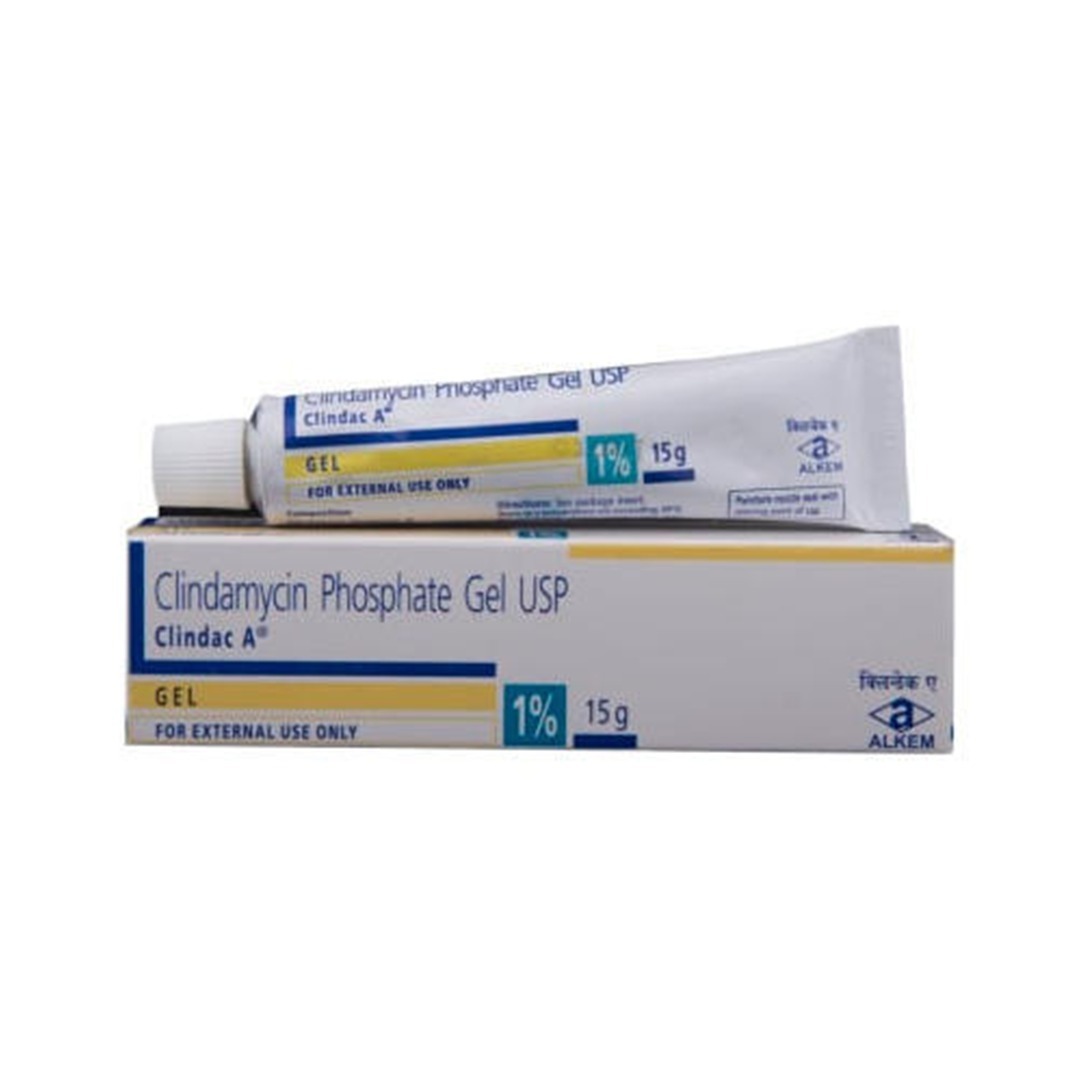Clindac A 1% 15 gram
Clindac A 1% 15 gram is a type of antibiotic known as a ‘lincosamide antibiotic,’ which is used to treat bacterial skin infections such as acne (pimples), as well as infections of the belly, bone, skin, heart, and soft tissues. When harmful bacteria develop in the body and cause illness, this is known as bacterial infection. It can infect and multiply in any area of the body extremely quickly. Clindac A 1% 15 gram is ineffective against viral illnesses like the common cold and flu.
Clindac A 1% 15 gram contains ‘Clindamycin,’ which prevents bacterial growth by blocking bacterial protein synthesis. It has a bacteriostatic action, which means it keeps germs from multiplying but does not kill them. Clindac A 1% 15 gram efficiently cures infections caused by gram-positive and anaerobic bacteria (those that do not require oxygen to survive), such as sensitive types of Staphylococcus aureus, Streptococcus pneumoniae, and Clostridium perfringens. Clindac A 1% 15 gram is used to treat serious infections in the abdomen, gastrointestinal system, lower respiratory tract, skin, and genitourinary area caused by sensitive anaerobic bacteria.
Oral, topical, injectable, and intramuscular versions of Clindac A 1% 15 gram are available. Clindac A 1% 15 gram is available in capsule and powder versions for oral administration. With or without food, swallow the pill whole with a glass of water. It should not be chewed, crushed, or broken. Clindac A 1% 15 gram comes in gel, cream, and lotion formulations. Clindac A 1% 15 gram is injected into the body using a syringe in both intravenous and intramuscular versions. Clindac A 1% 15 gram , like many drugs, has adverse effects, albeit not everyone experiences them. Stomach pain, nausea, vomiting, diarrhea, heartburn, joint pain/swelling, dark urine, and abnormal liver function tests are all common Clindac A 1% 15 gram adverse effects.
If you are allergic to Clindac A 1% 15 gram or any of its components, tell your doctor about it. If you have liver disease, kidney disease, gastrointestinal disease (colitis, which is an inflammation of the colon), or allergic disorders, tell your doctor (asthma, hay fever, eczema). Clindac A 1% 15 gram should not be used during immunizations with live bacterial vaccines (typhoid vaccine), as it may interfere with vaccine activity. As a preservative, the injection form of Clindac A 1% 15 gram may include benzyl alcohol, which can pass the placenta in pregnant women and produce gasping syndrome (multi-organ failure) in children. As a result, Clindac A 1% 15 gram should only be taken during pregnancy and nursing with the advice of a doctor. Antibiotic treatments can sometimes lead to antibiotic resistance. In such circumstances, your doctor may give antibiotics to which you are not allergic.
Clindac A 1% 15 gram is used to treat bacterial skin infections and acne.

Medicinal Advantages
Clindac A 1% 15 gram is an antibiotic that can be used to treat bacterial skin infections such as acne (pimples), as well as infections of the belly, bone, skin, heart, and soft tissues. It works by stopping bacteria from making proteins, which stops them from growing. It has a bacteriostatic action, which means it prevents germs from reproducing but not killing them. Clindac A 1% 15 gram efficiently cures infections caused by gram-positive and anaerobic bacteria (those that do not require oxygen to survive), such as sensitive types of Staphylococcus aureus, Streptococcus pneumoniae, and Clostridium perfringens. Clindac A 1% 15 gram is used to treat serious infections in the abdomen, gastrointestinal system, lower respiratory tract, skin, and genitourinary area caused by sensitive anaerobic bacteria.
Use Instructions
Oral, topical, injectable, and intramuscular versions of Clindac A 1% 15 gram are available. Clindac A 1% 15 gram is available in capsule and powder versions for oral administration. Capsule: Swallow the capsule whole, with or without food, with a glass of water. It should not be chewed, crushed, or broken. Clindac A 1% 15 gram comes in cream, gel, and lotion formulations. Cream/Gel/Lotion: Apply the recommended amount of gel/lotion/cream to the affected regions of the skin using clean, dry hands. With your fingertips, gently massage the drug into the skin. Before and after using Clincitop Gel 20 mg, wash your hands. Do not cover the afflicted regions with a dressing or a bandage. Clindac A 1% 15 gram IV injection: Clindac A 1% 15 gram IV injection is delivered as an infusion into a vein. Clindac A 1% 15 gram IM injection: Clindac A 1% 15 gram IM injection is given deep into the muscle. To learn how to use the injections, speak with your doctor or pharmacist. If the drug in the vial seems murky, changes color, or contains particles, do not consume it.
Store in a cool, dry location away from direct sunlight.
Clindac A 1% 15 gram Side Effects
Clindac A 1% 15 gram can cause stomach pain, nausea, vomiting, diarrhoea, heartburn, joint pain/swelling, dark urine, and abnormal liver function tests, just like any other medicine. The majority of these Clindac A 1% 15 gram adverse effects do not require medical care and fade away with time. Please contact your doctor if these side effects continue. Use of Clindac A 1% 15 gram for an extended period of time may result in oral thrush or a new vaginal yeast infection. If you have any of the following adverse effects: fever, lymph node swelling, rash, itching or swelling in the face, tongue, or throat, dizziness, or difficulty breathing, seek medical help.
Precautions and Warnings in Depth
Drug Recommendations
If you are allergic to Clindamycin or any of its components, do not use it. If you have liver disease, kidney disease, gastrointestinal disease (colitis, which is an inflammation of the colon), or allergic disorders, tell your doctor (asthma, hay fever, eczema). Clindamycin should not be used during immunizations with live bacterial vaccines (typhoid vaccine), since it may reduce the effectiveness of the vaccine. Clindamycin injections may contain benzyl alcohol as a preservative, which might cross the placenta in pregnant women and induce gasping syndrome (multiple organ failure) in children. Clindamycin should not be used during nursing since it can pass into breast milk and cause diarrhea, candidiasis (thrush, diaper rash), and, in rare cases, blood in the stool. As a result, Clindamycin should only be used during pregnancy and nursing with the advice of a doctor. Antibiotic treatments can sometimes lead to antibiotic resistance. In such circumstances, your doctor may give antibiotics to which you are not allergic.
Interactions Between Drugs
Antibiotics (erythromycin), anticoagulants (warfarin, acenocoumarol, and fluindione), and neuromuscular blocking drugs may all interact with clindamycin.
Clindamycin’s adverse effects may be lessened if you avoid drinking alcohol.
Drug-Disease Interaction: Before using Clindamycin, tell your doctor if you have any liver or kidney disease, gastrointestinal disease (colitis, which is an inflammation of the colon), or allergies (asthma, hay fever, eczema).
Safety Suggestions
ALCOHOL
Alcohol should not be used while taking Clindamycin because it may exacerbate the negative effects.
PREGNANCY
Injections of Clindamycin may contain benzyl alcohol as a preservative, which can pass the placenta in pregnant women and produce gasping syndrome (multi-organ failure) in children. If you are pregnant or expecting to become pregnant, talk to your doctor before using Clindamycin.
BREAST FEEDING
Clindamycin should not be used during nursing since it can pass into breast milk and cause diarrhea, candidiasis (thrush, diaper rash), and, in rare cases, blood in the stool. If you are a nursing mother, it is recommended that you use a different medication. If you are breastfeeding, talk to your doctor before using Clindamycin.
DRIVING
As a side effect of Clindamycin, you may feel dizziness. In such instances, refrain from driving or operating machinery until you have recovered.
LIVER
If you have a history of liver illness, tell your doctor before using Clindamycin since it might induce jaundice and abnormal liver function tests.
KIDNEY
Before taking Clindamycin, tell your doctor if you have a history of kidney disease.
No habit formation
Advice on Diet and Lifestyle
When taking a bath, use mild soap and opt for a warm bath.
On your skin, stay away from harsh products.
To avoid infecting the affected region, do not scratch or pick at it.
Manage your stress, eat well, drink enough of water, exercise regularly, and sleep well.
To avoid bacterial infections, avoid walking barefoot in locations like gym showers.
Caffeine and alcohol should be avoided or consumed in moderation.
Recommendations
Patients with severe liver disease should have their liver function monitored (liver function tests).
Clindamycin should be used in conjunction with a regular blood profile.
Clindamycin can induce Clostridium difficile-associated diarrhea (CDAD), thus it’s a good idea to get your intestines checked on a frequent basis.
When Clindamycin is used with anti-coagulants, coagulation (blood clotting) tests are advised.
Clindamycin use has been linked to Pseudomembranous colitis, which can range from moderate to life-threatening. As a result, it’s critical to explore this diagnosis in people who have diarrhea after taking Clindamycin.
Additional Information: This item is non-refundable.
Glossary of Diseases and Conditions
When harmful bacteria develop in the body and cause illness, this is known as bacterial infection. It can infect and multiply in any area of the body extremely quickly. Bacteria are classified as spherical, rod-shaped, or spiral-shaped. Bacteria can be gram-positive (have a thick cell wall) or gram-negative (have a thin cell wall) (do not have a cell wall). Cough, fever, and exhaustion are some of the most frequent signs of a bacterial infection. Acne is a skin ailment that occurs when oil and dead skin cells clog the hair follicles. Whiteheads, blackheads, and pimples are all possible side effects.
FAQs
Clindamycin is an antibiotic that is used to treat bacterial infections on the skin. It works by stopping bacteria from making proteins, which stops them from growing.
If you have liver illness, kidney disease, gastrointestinal disease (colitis, an inflammation of the colon), or allergic conditions, you should use Clindamycin with caution and seek medical advice (asthma, hay fever, eczema).
Even if you feel better, continue to take Clindamycin until the doctor’s recommended course is completed. Before the illness is totally treated, your symptoms may improve.
Clindamycin can reduce the efficiency of live vaccinations such as typhoid vaccine. If you are getting any immunizations, talk to your doctor before starting Clindamycin.
One of the negative effects of clindamycin is abnormal liver function tests. If you have a history of liver problems, talk to your doctor before taking Clindamycin.








Leave a Reply
You must be logged in to post a comment.